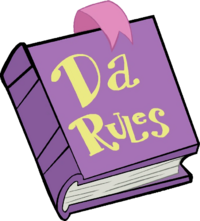Difference between revisions of "Tossup"
Kevin Wang (talk | contribs) |
Kevin Wang (talk | contribs) |
||
| Line 1: | Line 1: | ||
| − | {{Intro}} | + | {{Intro and Rules}} |
<onlyinclude> | <onlyinclude> | ||
A '''tossup''' (or '''toss-up''') is a question, usually containing several sentences, that is read out loud for both teams to attempt to answer. During a game, any player who believes they know the answer to a tossup can use their [[buzzer]] to [[interruption|interrupt]] the question and deliver an answer in an attempt to score points for their team. Tossup questions are the staple of gameplay for virtually all contemporary quizbowl. | A '''tossup''' (or '''toss-up''') is a question, usually containing several sentences, that is read out loud for both teams to attempt to answer. During a game, any player who believes they know the answer to a tossup can use their [[buzzer]] to [[interruption|interrupt]] the question and deliver an answer in an attempt to score points for their team. Tossup questions are the staple of gameplay for virtually all contemporary quizbowl. | ||
Revision as of 08:19, 20 October 2021
Tossup-Bonus Format
(Tossups · Bonuses)
Studying · Writing · Editing
NAQT · ACF · Housewrites
The circuit · Outreach
Resources
hsquizbowl.org
(database · archive · forums)
Discussion forums
College directory
Before the game
During the game
A tossup (or toss-up) is a question, usually containing several sentences, that is read out loud for both teams to attempt to answer. During a game, any player who believes they know the answer to a tossup can use their buzzer to interrupt the question and deliver an answer in an attempt to score points for their team. Tossup questions are the staple of gameplay for virtually all contemporary quizbowl.
Good quizbowl advocates for tossups in pyramidal style, in which a question begins with more in-depth knowledge about the answer and progresses towards easier clues, the intent being that more knowledgeable teams should answer before less knowledgeable teams.
Correctly-answered tossups are usually worth 10 points, though some tournaments allow for powers, in which an increased number of points, usually 15, is rewarded for a correct answer being given early in a tossup. When a player negs, or gives an incorrect answer before the tossup's end, their team cannot attempt to answer the question again and, under some rules, loses points.
Players have a finite amount of time after buzzing to provide an answer. In ACF, PACE, and NHBB gameplay rules, players have five seconds to begin their answer, while under NAQT rules, players have only two seconds. Additionally, if nobody buzzes in within five seconds (under ACF and PACE rules) or three seconds (under NAQT rules) of the end of a tossup, it is considered "dead," and the next tossup is read instead of proceeding to a bonus.
In Britain, tossups may be called "starters."
Example tossup
Nicolas Poussin painted this figure being helped by a faun onto a goat while looking at a putto attacking a young satyr. Four paintings also by Poussin depict this figure presenting weapons forged by Vulcan to her son. Jacques-Louis David’s last painting shows this figure disarming Mars. Two paintings by Rubens depict this figure gazing into a mirror held by another son who has wings. Titian made a depiction of this goddess reclining on a couch in a painting commissioned by the Duke of Urbino. Botticelli painted the birth and arrival on a seashell of, for 10 points, what figure, the Roman goddess of love?
ANSWER: Venus [do not accept “Aphrodite”]
(from 2012 ACF Fall)
